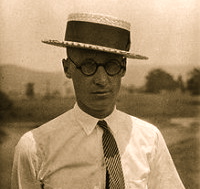John T. Scopes

The Scopes Monkey Trial Full Documentary
The Scopes Trial, formally known as The State of Tennessee v. John Thomas Scopes and commonly referred to as the Scopes Monkey Trial, was a famous American legal case in 1925 in which a high school teacher, John Scopes, was accused of violating Tennessee’s Butler Act, which made it unlawful to teach evolution in any state-funded school. The trial was deliberately staged in order to attract publicity to the small town of Dayton, Tennessee, where it was held. Scopes was unsure whether he had ever actually taught evolution, but he purposefully incriminated himself so that the case could have a defendant.
Scopes was found guilty and fined $100, but the verdict was overturned on a technicality. The trial served its purpose of drawing intense national publicity, as national reporters flocked to Dayton to cover the big-name lawyers who had agreed to represent each side. William Jennings Bryan, three-time presidential candidate for the Democrats, argued for the prosecution, while Clarence Darrow, the famed defense attorney, spoke for Scopes. The trial set modernists, who said evolution was consistent with religion, against fundamentalists who said the word of God as revealed in the Bible took priority over all human knowledge. The case was thus seen as both a theological contest and a trial on the veracity of modern science regarding the creation-evolution controversy.
John Thomas Scopes (born August 3, 1900 – died October 21, 1970) was a teacher in Dayton, Tennessee, who was charged on May 5, 1925 for violating Tennessee‘s Butler Act, which prohibited the teaching of evolution in Tennessee schools. He was tried in a case known as the Scopes Trial.
Biography
Scopes was born and raised on a farm in Texas before moving to Wisconsin as a teenager. In 1917 he moved to Salem, New Hampshire, and he was a member of the class of 1919 at Bishop Guertin High School Salem, NH. After he had earned a law degree at the University of Kentucky in 1924, Scopes moved to Dayton where he took a job as the Rhea County High School‘s football coach and occasionally filled in as substitute teacher when regular members of staff were off work.
Scopes’s involvement in the so-called Monkey Trial came about after the American Civil Liberties Union (ACLU) announced that it would finance a test case challenging the constitutionality of the Butler Act if they could find a Tennessee teacher willing to act as a defendant.
A band of businessmen in Dayton, Tennessee, led by engineer and geologist George Rappleyea, saw this as an opportunity to get publicity for their town and approached Scopes. Rappleyea pointed out that while the Butler Act prohibited the teaching of human evolution, the state required teachers to use the assigned textbook, Hunter’s Civic Biology (1914), which included a chapter on evolution. Rappleyea argued that teachers were essentially required to break the law. When asked about the test case, Scopes was initially reluctant to get involved, but after some discussion he told the group gathered in Robinson’s Drugstore, “If you can prove that I’ve taught evolution and that I can qualify as a defendant, then I’ll be willing to stand trial.”
By the time the trial had begun, the defense team included Clarence Darrow, Dudley Field Malone, John Neal, Arthur Garfield Hays and Frank McElwee. The prosecution team, led by Tom Stewart, included brothers Herbert Hicks and Sue K. Hicks, Wallace Haggard, father and son pairings Ben and J. Gordon McKenzie, and William Jennings Bryan and William Jennings Bryan Jr. Bryan had spoken at Scopes’s high school commencement and remembered the defendant laughing while he was giving the address to the graduating class six years earlier.
The case ended on July 21, 1925, with a guilty verdict, and Scopes was fined 100 dollars. The case was appealed to the Tennessee Supreme Court. In a 3-1 decision written by Chief Justice Grafton Green the Butler Act was held to be constitutional, but the court overturned Scopes’s conviction on a technicality: the judge had set the fine instead of the jury. The Butler Act remained until May 18, 1967, when it was repealed by the Tennessee legislature.
Scopes may have actually been innocent of the crime to which his name is inexorably linked. After the trial Scopes admitted to reporter William Kinsey Hutchinson “I didn’t violate the law,” (DeCamp p. 435) explaining that he had skipped the evolution lesson, and his lawyers had coached his students to go on the stand; the Dayton businessmen had assumed he had violated the law. Hutchinson did not file his story until after the Scopes appeal was decided in 1927. Scopes also stated that he had not violated the law to the wife of the Universalist minister Charles Francis Potter.
After the trial Scopes accepted a scholarship for graduate study in geology at the University of Chicago. He then did geological field work in Venezuela for Gulf Oil of South America. There he met and married his wife, Mildred, and was baptized in the Roman Catholic Church. In 1930, he returned to the University of Chicago for a third year of graduate study. After two years without professional employment, he took a position as a geologist with the United Gas Company, for which he studied oil reserves. He worked, in Houston, Texas then in Shreveport, Louisiana, until he retired in 1963. He died on October 21, 1970 at the age of 70.


